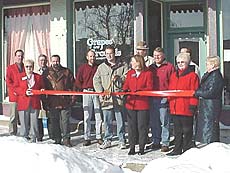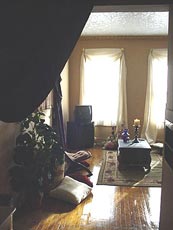|
According
to Steve Siltman, operations director, LCP maintains a good
relationship with the hospital. Most of the employees of LCP are
former employees of the hospital. Also, LCP bought most of the
equipment from the hospital’s former ambulance department and
rents office space from the hospital. Siltman says that the hospital
has been supportive of the founders of LCP in their efforts to
operate as a self-contained business.

LCP
is run by four officers and a board of directors. Dr. Blaum is the
president and CEO of LCP. The other officers are Warren Peters, vice
president; Shirley Edwards, treasurer; and Robert Thomas, secretary.
The board of directors is composed of individuals from all over
Logan County. Shelly Barger is from Atlanta. Eldon Behle and Warren
Rogers are from Elkhart. Suzanne Aper represents New Holland. James
Stauffer is from Beason, and Gene Bathe is from Hartsburg. Randal
Storm is the representative from here in Lincoln. The philosophy is
that an organization covering Logan County needs to have input from
all areas of the county.
Steve
Siltman, a paramedic for over 25 years, is a liaison between the
officers, board of directors and employees of LCP. In contrast to
most of LCP’s employees, he works typical office hours directing
the company. He also is on call most of the time he is not in the
office. Siltman has three shift managers that oversee the paramedics
whether he is in or out of the office. John Olmstead manages shift
A, Penny Thomas is in charge of shift B and John Short oversees the
C shift.

[A five-cent tax levy generates
$125,000 to $130,000 each year, which helps support LCP's four
ambulances.]
LCP
has 14 full-time employees, including an office clerk, and 12
part-time employees. The employees are broken down into three
shifts, with each shift working 24 hours. Because there are three
shifts, the paramedics work one day and then are off two days. This
allows them to be available 24 hours a day, 365 days a year. The
building which houses LCP not only has offices but also a living
room, kitchen and sleeping quarters. Just like firefighters, the
paramedics can eat, sleep and relax in between emergency calls.
Siltman
explained the three designations of rescue workers. Emergency
Medical Technician (EMT) Basic is the first level. EMT Basic
training is equivalent to one college semester of classroom
learning. The next level, EMT Intermediate includes the training of
EMT Basic and adds fieldwork experience. EMT Paramedic is the top
designation for a rescue worker. Some of the training it requires
are 400 hours in a classroom, 400 hours of fieldwork, covering a
specific number of calls, answering different types of calls and
spending time in different departments of a hospital.

In
order for a rescue operation to be certified by the government, it
needs only one EMT Paramedic on staff. All of LCP full-time workers
are EMT Paramedics. All but one of the part-time workers are EMT
Paramedics also. That worker is an EMT Intermediate level rescuer.
As
in many other fields, rescue workers regularly practice their skills
to keep their knowledge and abilities fresh. Every third Thursday,
the paramedics review their training. Gene Simers is the education
coordinator at LCP. He is a state instructor who teaches the review
courses or chooses another paramedic to teach the class. These
courses are provided at LCP, by LCP for the paramedic workers.

The
LCP still uses a lot of equipment it bought from the hospital last
year: uniforms, radios, office equipment and medical equipment. This
year, they received a $75,000 grant from Illinois First. So far, LCP
has spent $36,000 on four new monitor defibrillator units — one
for each ambulance they own. The remaining $39,000 will be used to
update other equipment.
[to top of second column in
this article]
|

[Shirley Bree is the office
coordinator for LCP.]
LCP
is a business, and it is partially subsidized by tax dollars. In
1975, a five-cent tax levy was placed on every $100 dollars of
property evaluation. The $125,000 to $130,000 this levy generates
each year goes towards the ambulances and ambulance service. Prior
to LCP’s existence, Abraham Lincoln Memorial Hospital received
this money because it owned the ambulances.
The
public provides only a portion of LCP’s income; most of the
revenue is earned by charging ambulance riders. An individual will
be billed whether the ride was an emergency or a transport between
the hospital and nursing home. Ambulance bills are treated like any
hospital or doctor’s visit. LCP bills the primary insurance,
secondary insurance and Medicare before the balance is billed to the
rider.

Despite
the paramedics’ lack of business training, they are doing very
well in their first year. Someday they hope to own their own
building. Steve Siltman has learned that "by sticking together
and maintaining one’s set of priorities, that incredible things
can happen."
Over
the past year, LCP has answered 3,100 requests, most of which have
been emergency calls. Sometimes LCP receives non-emergency calls to
transport someone from a hospital to a long-term care facility in
Lincoln, Bloomington, Springfield or Decatur. Due to the setup of
the 9-1-1 system, the emergency calls LCP receives are limited to
Logan County. The most frequent type of calls are those related to
heart conditions. Calls related to respiratory problems are the
second highest number. After that are the trauma or accident calls.

According
to Siltman, one memorable rescue call this past year happened just
last week. Heather Givan and John Short delivered a baby because the
mother was unable to get to the hospital. Siltman says that those
types of calls are very rare; he has only done a couple in his 25
years as a paramedic.
Logan
County residents should be proud of their paramedics. The national
average for rescuing heart failure patients is 3 percent. LCP’s
record is 13 percent. Siltman credits this to the high level of
training of the association’s workers and the speedy reaction time
of Logan County rescue teams. This has given Logan County a lot of
recognition.

As
in any profession, emergency rescue workers know which organizations
are the best places to work with and which ones are less desirable.
"The word is already out that this is a good place to
work," Steve Siltman says. He presently has at least 20 resumes
filling his drawers.
In
the past year, LCP has grown as a group. The year has been
"full of challenges, but very rewarding," commented
Siltman. He says that all the employees have done their job, and
good things were accomplished. LCP wants to thank everyone in the
community that supported them in their first year, and they plan to
continue working as they have been.
If
you need to contact the LCP for an emergency, dial 9-1-1. If you
have a non-emergency message, their office phone number is 732-2212.
[Jean
Ann Carnley]
|
|
One of
the major complaints at the public hearing was the increase in price
of some licenses, according to Glenn Shelton, chairman of the
ordinance committee. The proposed increase in the Class A license,
which allows liquor to be sold at retail but not for consumption,
was $250, from $1,250 to $1,500. The ordinance committee agreed to
raise the fee only $100, from the former fee of $1,250 to $1,350
rather than to $1,500.

Committee
members also changed the fee for the Class C license, which allows
for consumption of liquor on the premises and also for retail sale.
This license, formerly $1,250, is also raised $100, to $1,350,
according to Shelton. No other fee changes were made.

Shelton
said the committee took note of the request some license holders
made for permission to serve liquor earlier on Sundays. The proposed
hours for the new ordinance were from 1 p.m. to midnight Sunday.
License holders asked for a noon or even 11 a.m. serving time, both
for restaurants which want to serve champagne brunch and for sports
bars. The committee decided to permit liquor service to begin at
noon, Shelton said, but decided not to change any closing hours,
which will remain midnight on Sunday and 2 a.m. on weekdays.

[to top of second column in
this article]
|

Another
complaint from license holders was that under the new code not
enough Class C licenses would be available. Ten Class C licenses and
10 Class B licenses, which would allow for consumption of liquor on
the premises but not for retail sale of liquor, had been proposed.
Most holders appeared to want Class C licenses, Shelton said. All
present license holders will be given the opportunity to state which
license they want, he said, and enough Class C licenses will be
available to accommodate both existing businesses and any new ones
that would like that license class.
The
Class C license would also allow for sale of liquor at drive-up
windows, Shelton said.

The
proposed new code will allow 18-year-olds to sell and serve liquor
if supervised by someone 21 years or older. Some license holders had
objected to this provision, while others said without 18-year-olds
they would not be able to hire enough servers. The committee decided
not to change the age limit, as that is in accordance with Illinois
statutes, Shelton said.
He
said the changes would be made, copies of the revised code sent to
all license holders, and another public hearing would take place
sometime in January, at which the committee will again listen to
input from licensees.
Shelton said he would like
to have the new code completed by the first of February, as the
liquor licenses expire April 30. He said he did not anticipate any
more major changes in the code.
[Joan
Crabb]
|
|
Eventually,
there will be four suites available in the bed and breakfast, each
with a different theme. At the present, only the Arabian room is
finished. The next room will have a medieval theme and is scheduled
to be finished by the fall of 2001. The other two themes are unknown
at this time.

John
and Jason Steffens are transforming old apartments into formal
accommodations. So far they have done all the labor themselves and
plan to finish the rest of the rooms in the same manner. This is why
the second room will not be available until the fall of 2001. In
restoring and decorating the room, Jason Steffens said, "We
wanted the rooms to look classy, not cutesy." Two
characteristics which add to the room’s ambience are original wood
floors and a pressed tin ceiling.

The
hallway and Arabian room look very professional. The entrance to the
suites is just down from Grapes and Grounds. At the top of the
stairs, guests step into a Victorian hallway. A wood-paneled
fireplace is the focus of the hallway, and antique pictures and
photographs hang on the wall. The first room is decorated in deep
plum, beige and dark wood. The bathroom has a Jacuzzi tub and
rain-shower shower head. The main area has a plush couch, Oriental
carpets and decorations, television, a breakfast table for two, a
microwave and a small refrigerator. The bedroom is lined in 150
yards of beige fabric, to simulate an Arabian tent. A covered basket
serves as a nightstand.
[to
top of second column in this article]
|

The
medieval suite will have a queen-sized bed, bearskin rug, suits of
armor and other decorations to fit the theme. It will also have a
breakfast table, microwave, refrigerator and television. The
Steffenses plan to install a Jacuzzi tub and rain-shower shower head
as well.

Yesterday
morning’s ribbon-cutting was just a formality, because the Arabian
room has already been used seven times in the past month. This is
encouraging to members of the Chamber of Commerce and the mayor. At
the ribbon-cutting several members mentioned that a
bed-and-breakfast will flourish in the town of Lincoln. Eckert’s
Suites is only a stone’s throw from the Lincoln Depot. John and
Jason Steffens hope that the proximity of Eckert’s to the railroad
and its unique décor will attract business travelers — either
alone or with their spouses.
If
you are interested in reserving the Arabian room for either pleasure
or business, call Eckert’s Suites at 732-6102.
[Jean
Ann Carnley]

|